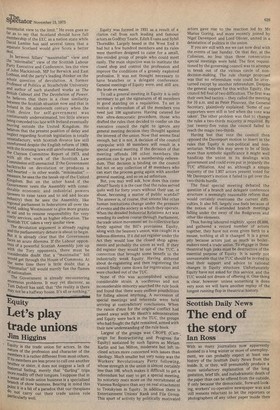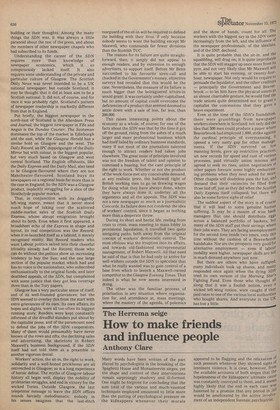Scottish Daily News
The end of the story
Ian Ross
With so many journalists now apparently doomed to a long winter or more of unemployment, we can probably expect at least one history of the Scottish Daily News from the inside. It, or they, will presumably produce a more satisfactory explanation of the long gestation, brief life, andmelodramatic death of the paper than can be offered from the outside, if only because the democratic, forward-looking, workers' co-operative newspaper was and still remains reluctant to let the reporters or . photographers of any other paper inside their
building or their thoughts. Among the many things the SDN was, it was always a little paranoid about the rest of the press, and about the members of other newspaper chapels who had subscribed to its funds.
Understanding the career of the SDN requires more than knowledge of newspaper economics, which it so conspicuously lacked itself. It also requires some understanding of the private and particular culture of Glasgow. The Scottish Daily News was never intended to be a UK national newspaper; but outside Scotland, it may be thought that it did at least aim to be A Scottish national. It did not, of course, and for once it was probably right. Scotland's pattern of newspaper readership is markedly different from that in England.
Put briefly, the biggest newspaper in the north-east of Scotland is the Aberdeen Press and Journal; the biggest newspaper in Fife and Angus is the Dundee Courier; The Scotsman dominates the top of the market in Edinburgh and the east, while the Glasgow Herald has a similar hold on Glasgow and the west. The Daily Record, an IPC doppelganger of the Daily Mirror but with colour, is the biggest popular, but very much based on Glasgow and west central Scotland. The English offshoots, like the Daily Express and the Daily Mail, also tend to be Glasgow-flavoured where they are not Manchester-flavoured. Scotland buys its newspapers on a regional basis far more than is the case in England. So the SDN was a Glasgow product, implicitly struggling for a slice of the Strathclyde popular market.
That, in conjunction with its doggedly left-wing stance, meant that it never stood much hope of taking over the scattered middle-market sales of the Scottish Daily Express, whose abrupt emigration brought about its birth. Even when it first appeared, a broadsheet echo of the Express in shape and layout, its real competition was the Record; when it re-launched itself as a tabloid, it merely recognised reality. But Record readers who want Labour politics salted into their cheerful triviality already had the Record; those who can do without the politics show an increasing tendency to buy the Sun; and the one large section of the popular market which had and has no voice is the nationalists, who subscribed enthusiastically to the original funds, and later deathbed appeals, of the SON, but complained with some justice that they got less coverage there than in the Tory papers.
Glasgow has a very particular sense of itself, and of its well-founded grievances; but the SON seemed to overlay this from the start with extra grievances of its own. Its own affairs, its hopes and slights, were all too often its biggest running story. Readers were kept constantly informed of the dreadful slanders put about by the capitalist press, and of the paramount need to defend the jobs of the SDN cooperators. Many of them would presumably have never known of the rows and rifts, the declining sales and advertising, the skeletons in Robert Maxwell's business background, if the SDN itself had not told them as a preamble to another vigorous denial.
Workers' action, the sit-in, the right to work, solidarity and a well-honed prickliness are all entrenched in Glasgow; so is a long experience of heroic defeat. The myths of Glasgow labour history all begin well, display the nobility of proletarian struggles, and end in victory for the wicked Tories. Outside Glasgow, the last teleprinter message to leave the SDN offices sounds farcially melodramatic: nobody in his senses imagines that the last-ditch rearguard of the sit-in will be required to defend the building with their lives, if only because nobody seems to want the building except Mr Maxwell, who commands far fewer divisions than the Scottish TUC.
The reasons for its failure are quite straightforward, then; it simply did not appeal to enough readers, and by extension to enough advertisers, to support itself. Before Mr Benn succumbed to his favourite siren-call and chucked in the Government's money, objective surveys had revealed that this would be the case. Nevertheless, the measure of its failure is much bigger than the beleaguered sitters-in would grant: it was certainly under-capitalised, but no amount of capital could overcome the deficiencies of a product that seemed doomed to settle down with a sale of less, far less, than 200,000.
This raises interesting points about the economy as a whole, of course; for one of the facts about the SON was that by the time it got off the ground, rising from the ashes of a much larger and more professional business which had itself failed by ordinary business standards, many if not most of the journalists talented enough to attract readers had taken jobs elsewhere. The great issue of principle involved was not the freedom of talent and opinion to command a hearing, but the cant principle of the right to work. Whether or not the product of the work-force met any conceivable demand, at any realistic price, the hallowed right of British working men to go on drawing wages for doing what they have always done, where they have always done it, underlay all the arguments and all the appeals. The SDN was not a new newspaper so much as a journalistic Concorde. Its failure does not condemn the idea of workers' control, since it began as nothing more than a desperate throw.
During its short and hectic life, reeling from crisis to crisis, mass meeting to mass lobby to provisional liquidation, it travelled two quite intriguing paths, both away from the original concept of workers' democratic control. The most obvious was the irruption into its affairs, and towards old-fashioned entrepreneurial management, of Robert Maxwell. All that need be said of that is that he had only to arrive for well-wishers outside the SDN to speculate that what he really wanted was to gain control of a base from which to launch a Maxwell-owned competitor to the Glasgow Evening Times. That indeed is what he now seems interested in doing.
The other was the familiar process of polarisation in any situation where organisation for, and attendance at, mass meetings, where the mastery of the agenda, of polemics
and the show of hands, count for all. The workers with the biggest say in the SDN came increasingly from the left, and the influence of the newspaper professionals, of the idealists, and of the SNP, declined.
It is quite probable that the sit-in, and the squabbling, will drag on; it is quite improbable that the SDN will stagger up once more from Its pyre, and not very likely that Mr Maxwell will be able to start his evening, or twenty-four
hour, newspaper. Not only would he require to persuade the liquidator, and the other creditors — principally the Government and Beaver brook — to let him have the physicalassets as an almost charitable gesture, he would find the trade unions quite determined not to grant capitalist the concessions that they gave a brave experiment. Even at the time of the SDN's foundation, there were grumblings from n.ewspaPer workers elsewhere in Scotland: not only did the idea that 500 men could produce a paper where Beaverbrook had employed 1,800, strike against the cardinal principle of overmanning, It opened a very nasty gap for other managements. If the SDN survived on low manning levels, gave up restrictive practices, set new records for speed and cost of various processes, paid virtually union minima and agreed to seek no rises, union negotiators at other papers foresaw some highly embarrassing problems when they next asked for more. Other chapels will doubtless pass the hat, and demand that their vacancies be filled from those laid off, just as they did when the Scottish Daily Express itself collapsed; but there voll also be some furtive sighs of relief.
The saddest aspect of the story is of course
that it will lead to some genuine human suffering. It may be a maxim of wise bank managers that one should distribute eggs across a balanced portfolio of baskets, but many of the SDN staff put their savings where their jobs were. They are facing unemployment for the second time inside two years, only this time without the cushion of a BeaverbroOlc handshake. Nor are the prospects very good for alternative employment — even if labonr mobility were higher, newspaper skills are not in much demand anywhere just now.
But there are others who have suffered; _many individuals took up shares, and manY responded once again when the dying SOS tried its own version of the Morning star's Fighting Fund. Even those who thought all along that it was a foolish notion, even a wicked left-wing notion, were caught if they paid rates to one of the various local authorities who bought shares. And everyone in the Lig has lost a little.



































 Previous page
Previous page